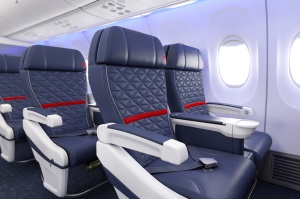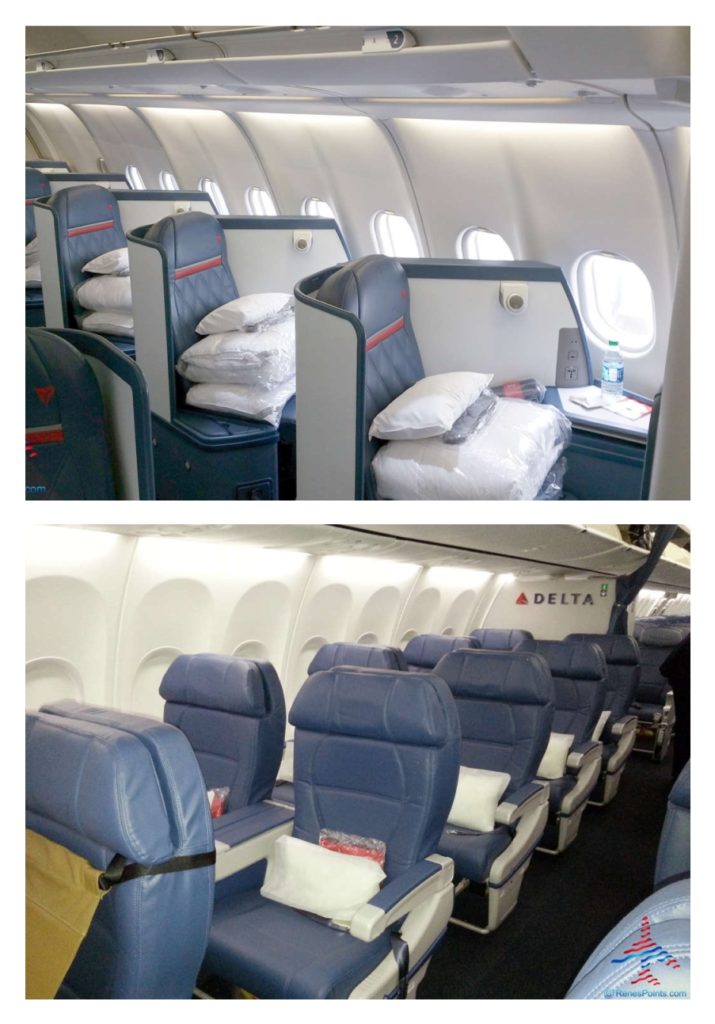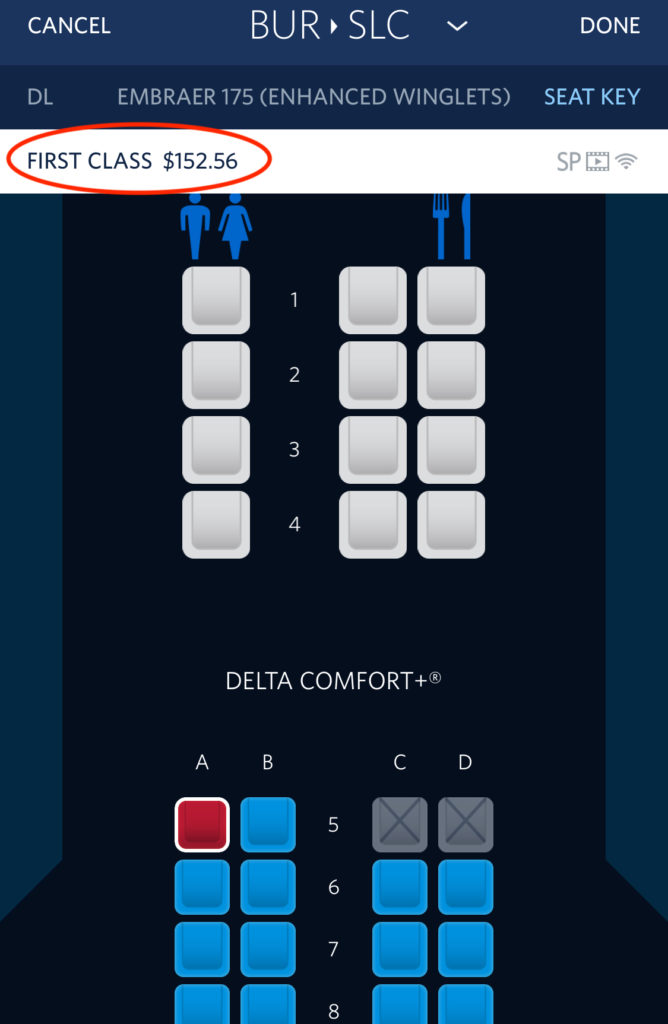Advertiser Disclosure: Eye of the Flyer, a division of Chatterbox Entertainment, Inc., is part of an affiliate sales network and and may earn compensation when a customer clicks on a link, when an application is approved, or when an account is opened. This relationship may impact how and where links appear on this site. This site does not include all financial companies or all available financial offers. Opinions, reviews, analyses & recommendations are the author’s alone, and have not been reviewed, endorsed, or approved by any of these entities. Some links on this page are affiliate or referral links. We may receive a commission or referral bonus for purchases or successful applications made during shopping sessions or signups initiated from clicking those links.

During Delta’s quarterly investors’ call this week, mothership brass revealed a surge in premium seat purchases. But more cushy seats sold = fewer seats for Medallion®s to enjoy complimentary upgrades.
Delta CEO Ed Bastian noted (via Business Insider‘s David Slotnick) 65-70% of premium cabin seats are purchased by travelers. That’s a sharp increase from eight years ago — when Delta sold only 13% of its domestic first class inventory.
The airline is pushing first class buy-ups more aggressively than before. SkyMiles are treated as currency to purchase upgrades. And don’t forget the $2 upgrade opportunity a Delta flyer enjoyed.
As we’ve written on this blog, Delta is not a charity. They’re a for-profit business. You can’t begrudge them for selling seat and making money.
But complimentary upgrades are a huge perk of elite status — and Delta knows it.
As a Medallion® Member, we know upgrades are important to you.
Fewer upgradeable seats make Medallion® members rethink their loyalty. In fact, yesterday afternoon’s post drew a few commenters unhappy with upgrades.
With upgrades on the decline, what can help you “buy” first class seats without breaking the bank?
Save on Delta First Class Seats – With Points
There are several ways points and miles can get you upgraded to first class.
Upgrade Using Points
Delta SkyMiles members can use points for first class upgrades as award seats.
But like other awards (tickets, Global or Regional Upgrades, etc), inventory can be very limited. And you may spend a lot of time on the waitlist.
If you want to buy a guaranteed first class seat, we have a couple more options.
“Buy up” Using SkyMiles
When you purchase a Main Cabin or C+ plus seat for a Delta flight, you’ll likely be given the chance to purchase a first class upgrade.
Delta SkyMiles members can — inventory allowing — purchase “cash” upgrades at a rate of one SkyMile = one cent.
In the above example, my upcoming flight from Burbank to Salt Lake City would run about 15,256 SkyMiles for a first class upgrade.
Want First? Buy First! (Using American Express Membership Rewards Points)
You can apply American Express Membership Rewards points toward airfares purchased through AmexTravel.com. Like SkyMiles, MRs are worth a cent each when applied to airline ticket purchases. If you’re MR points-rich and really want first class, consider this option. Plus, these qualify as cash/paid tickets — earning all applicable MQM, MQS, MQD. and SkyMiles.
But here’s where it gets interesting — if you have the right Amex card.
The American Express Business Platinum card (read more about this card) gives cardholders a 35% refund when paying with points. (Cardholders must select a preferred airline — such as Delta — to use for coach tickets or purchase an eligible first or business class seats to receive the benefit.)
A $1000 first class ticket paid entirely with 100,000 MR points would ultimately cost the cardholder 65,000 points. Again, these trips code as cash tickets — allowing a nice scoop of MQM and MQD (and SkyMiles).
Frankly, the 35% rebate perk is reason enough for me to hold on to my Amex Business Platinum card (learn more about this card).
Increase Your Upgrade Chances with an American Express Delta Reserve Card
If using cash or points for first class seat purchases isn’t your jam, remember the American Express Delta Reserve Card personal (learn more) and business cards (learn more) serve as a tie-breaker in the upgrade hierarchy (after Medallion® status and fare class). My dad noticed a spike in upgrades once he became an American Express Delta Reserve Card personal cardholder (learn more).
What Do You Think?
Is Delta’s huge increase in first class sales a temporary boon? Or are complimentary upgrades on the way out?
Please us your thoughts in the Comments section below! — Chris
Advertiser Disclosure: Eye of the Flyer, a division of Chatterbox Entertainment, Inc., is part of an affiliate sales network and and may earn compensation when a customer clicks on a link, when an application is approved, or when an account is opened. This relationship may impact how and where links appear on this site. This site does not include all financial companies or all available financial offers. Opinions, reviews, analyses & recommendations are the author’s alone, and have not been reviewed, endorsed, or approved by any of these entities. Some links on this page are affiliate or referral links. We may receive a commission or referral bonus for purchases or successful applications made during shopping sessions or signups initiated from clicking those links.











True, not a charity but at the same time true ‘one way’ loyalty. Smug Ed has the gall to espouse being loyal to Delta on the seatback pre-flight safety video sales pitch message just before the dumb cartoon video. Etched into memory is also the smug pair of Ed and Doug a few months ago in a WSJ article of ‘pay up if you want to move up!’. Made it was inevitable with Richard’s departure now years ago, but loyalty and related upgrades have been swirling ever more rapidly down the delta drain, and delta isn’t worth much more than that solid going down the drain.
Delta typically holds back 2 to 3 seats on regular domestic routes for elites while most of the other seats will sell as upgrades are what I’ve seen lately. I even had a gate agent tell me they hold back 3 seats for elite upgrades on day of the flight. So basically if you aren’t in that top 1 to 4 upgrades slots on the list your chances at a free upgrade are much lower than in the past I’d think.
I’ve felt this way for years: To the airline executives , we are not passengers, we are freight that breathes and requires some attention.
In the past, F fares were 10x coach fares so no one ever bought them, making a lot of seats available for upgrades. Then came the Y-UP and Q-UP fares, where DL was competing with LCCs (typically AirTran) that offered a premium cabin. Now, most F fares are typically more like 2x or 3x of coach so it is a bit more affordable for those willing to pay – and many are.
In the decade of the 2000’s as a platinum (top tier for most of that time), I was _always_ upgraded, which was a nice perk – and yes, you get spoiled. By the mid-2010’s, it became obvious that upgrades just weren’t going to happen, even when I made Diamond. For flights where F was more important (e.g. longer haul), I just starting using points to buy up and, as your article points out, buying up gets you MQM and F bonus points, which a regular upgrade will not.
We can’t live in the past. There were a lot of perks back then that have gone by the wayside. Rather than lament “the golden days” we need to adapt and refocus on maximizing the benefits with the current rules.